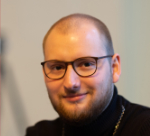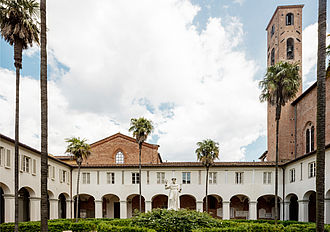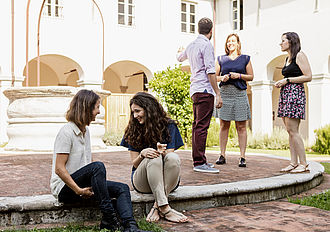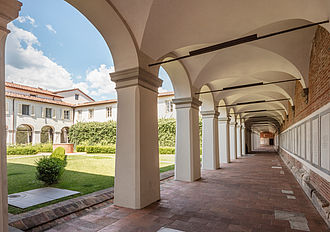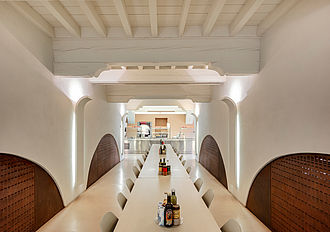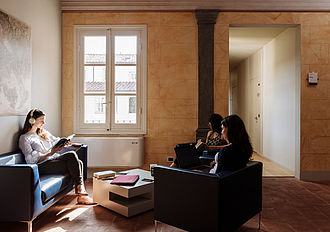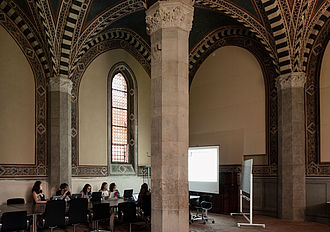Summerschool
Game Theory meets Game Design: Prototyping Circular Economies
This summer school is an intensive practice-oriented programme in which interdisciplinary knowledge will merge into a project-based workshop: during the Game Jam students will develop analogue games by applying insights from game theory to issues about circular economy and sustainability.
Students will acquire new skills and enhance their skillset by collaborating on a joint project. In supplementary courses, participants get new perspectives on game design and are enabled to develop game prototypes in the short time available.
Key Facts
| Dates: | May 2nd - 31st 2023: Supplementary online courses
June 1st - 11th 2023: IMT School for Advanced Studies Lucca (Italy)
|
|---|---|
| Teaching language: | English |
| Certification: | Certificate of participation (5 ECTS credits) |
| Tuition fees: | No participation fees |
| Included Expenses: |
|
| Expenses to consider |
|
| Capacity: | 15 qualified students will be admitted |
Scholarships
Based on the applications’ quality and availability of accommodations, the school can host participants within its facilities. These should be explicitly requested by the applicants in the motivation letter, also specifying the reasons for such request.
Application
Eligible for participation are all 3rd semester of Bachelor or higher, Master or PhD students enrolled at a university in the fields of Game Design, Design, Economics, Game Theory, Psychology, Decision Science and Sustainability, and related disciplines. 15 qualified students will be admitted.
Submission of application: February 1st - March 31st
Confirmation of acceptance: On a rolling basis until all places are allocated
Interested candidates should send:
- Certificate of enrollment of your university
- Transcript of Records
- Evidence of academic qualifications (degree certificates, if available)
- Motivation letter (approx. 250 words, English)
- Statement of language level (at least English B2)
- Curriculum vitae (tabular)
Application and questions to: summerschool.lucca@dehive.de
Photo Gallery
Lecturers
Prof. Dr. Ennio Bilancini
Ennio Bilancini is full professor of Behavioral Economics and Game Theory at the IMT School for Advanced Studies Lucca, where he is also the Director of the PhD program in Economics, Analytics and Decision Sciences. Also, he acts as the Director of the Game Science Research Center and the Coordinator of the GAMES WIS. Ennio has an expertise in behavioral economics, game theory, evolution, strategic thinking and measures of welfare, experimental methods, sustainability and well-being. He actively works for the promotion of game science, advocating the practice of measuring quantitatively the impact of gaming on humans' behaviours, skills and beliefs.
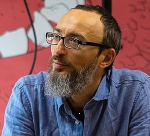
Prof. Thomas Bremer
Thomas Bremer is a professor in the Game Design programme at HTW Berlin. He holds a degree in art from the HfBK Hamburg and looks back on 18 years of professional experience in the media and entertainment industry. He has been conducting intensive research in the fields of game studies, game technology and game design since 2006.
In 2008, he initiated the Game Design degree programme at HTW Berlin and is co-founder of the DE:HIVE Institute. His expertise lies in game conception and development, virtual reality, augmented reality, system development, analysis of game systems, development of technical system architectures and coaching in the segment of game system design.
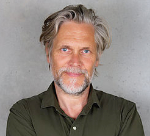
Prof. Dr. Leonardo Boncinelli
Leonardo Boncinelli is a professor of economic policy at the University of Florence and member of the Scientific Committee of the Game Science Research Center. His background is in game theory, i.e., the study of interactions in groups of interconnected agents. His research interests have led him to study also evolutionary game theory, social dynamics, bounded rationality, behavioural rules, institutions, social norms, prosocial behaviour, cognitive foundations of decision-making, and experimental methods.
His current focus is on "game-based policies", i.e., how gamification and game-based learning can inform public policies to face societal challenges and increase community well-being.
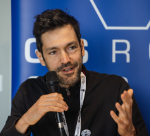
Dr. Roberto Di Paolo
Roberto Di Paolo is a researcher at the IMT School for Advanced Studies Lucca and the Secretary of the Game Science Research Center. His position is based on the project grant "applying behavioural economics to game-based education". His research focuses on behavioural and experimental economics, game-based learning, and prosocial behaviour. Currently, he is interested in studying the impact of game-based educational programs applying experimental methodologies, trying to assess the causal effect of game-based tools on different behaviours.
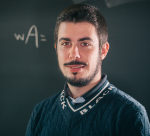
Sebastian Plesch
Sebastian Plesch is a software engineer and game technology researcher, holding a Master's degree in Computer Science and Media. Working as a research assistant and lecturer in the Game Design programme at the HTW Berlin for over 6 years, Sebastian has extensive knowledge of the game design and development process. Additionally, he works with the game startup Toukana Interactive on the award-winning game Dorfromantik.
Sebastian has a passion for game technology and in particular new developments in the games industry such as virtual reality. In various research projects at the DE:HIVE institute, he realized the potential of these game technologies in non-gaming applications. At the same time, he acknowledges the importance of computer science fundamentals in game development and tries to make that knowledge available to game design students in their first years in a fun and engaging way.

Johannes Knop
Johannes Knop is a game designer and design researcher. He's chairman and co-founder of the Randwerk Games Cooperative, the studio behind the indie-game ABRISS.
With degrees in Game Design and System Design, his academic projects have been concerned with design methods & processes for game creation, the intersection of work and games and games as educational tools. This research is put to the test every day in the practical business world of developing, designing and coordinating for Randwerk. He teaches at HTW Berlin and a private design institute.
